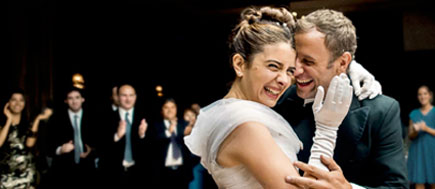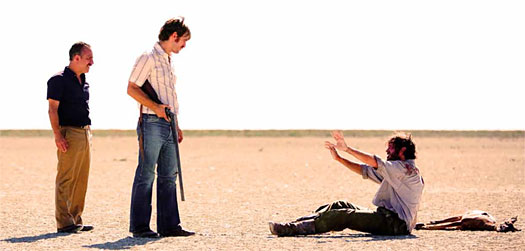Seven films from six countries in four days highlight Lawrence University’s 5th annual Latin American and Spanish Film Festival April 20-23.
The festival features some of the best films from the 2014-2015 international season, including two Academy Award nominees as well as winners and nominees at some of the most prestigious international competitions and festivals.

Each film, shown in Spanish with English subtitles in the Warch Campus Center cinema, is free and open to the public. All the films are rated R, for mature audiences only.
“The goal of the festival is to bring to the Fox Cities the seven best Latin American and Spanish films of 2014 and 2015,” said Rosa Tapia, associate professor of Spanish and organizer of the festival. “Several of the films have not been commercially released yet and none have come to theaters in our area.
“As always, we are proud to present a slate of stellar regional premieres that Lawrentians, neighbors and friends can enjoy for free on the big screen,” Tapia added.
Complementing the film screenings will be a pair of presentations during the festival. Sophia McClennen, professor of international affairs and comparative literature at Penn State University and the founding director of its Center for Global Studies, presents “Latin American Cinema and Globalization” Friday, April 22 at 4:30 p.m. in Thomas Steitz Hall of Science 102.
One of the most respected intellectuals and commentators on global and political affairs and their portrayal by the media, McClennen has held a Fulbright faculty award in Peru, where she researched Peruvian cinema and has taught and conducted research around the world, including Argentina, Bolivia, Chile, Costa Rica, Germany, Guatemala and Uruguay.

On Saturday, April 23 at 7 p.m., Brionne Davis, the lead actor who portrays the American scientist Richard Evans Schultes in the film “Embrace of the Serpent,” will conduct a question-and-answer session about his experiences in making the film.
Two free bookend festival receptions, an opening one at 7 p.m. on April 20 and a closing one on April 23 at 7:30 p.m., will be held in the Warch Campus Center.
“The receptions are always very popular and lively components of the festival,” said Tapia. “Our audience members enjoy passionate discussions about the films, mingle with organizers and student volunteers and get to hang out with special guests.”
This year’s festival schedule:
• Wednesday, April 20, 5 p.m. “Wild Tales” directed by Damian Szifron (Argentina, 2014): A best foreign language Academy Award nominee, this hilariously deranged satire comprises six standalone shorts revolving around extreme human behavior in times of distress.
• Wednesday, April 20, 8:30 p.m. “Magical Girl” directed by Carlos Vermut (Spain, 2014): In this neo-noir film, the father of a terminally-ill girl tries to obtain his daughter’s last wish — the official costume of the main character of a Japanese TV series. Due to the costume’s high cost, he becomes involved in a bizarre chain of blackmail schemes.
• Thursday, April 21, 6 p.m. “600 Miles” directed by Gabriel Ripstein (Mexico, 2015): ATF agent Hank Harris attempts to apprehend Mexican arms smuggler Arnulfo Rubio, but ends up getting kidnapped by him instead. During the 600-mile journey to Rubio’s bosses, the two men slowly befriend each other.
• Thursday, April 21, 8:30 p.m. “From Afar” directed by Lorenzo Vigas (Venezuela, 2015): First-time director Lorenzo Vigas won the Venice Film Festival’s prestigious Golden Lion Prize for Best Picture with this story of a middle-aged gay man who wanders the streets of Caracas searching for young companions.
• Friday, April 22, 8:30 p.m. “The Club” directed by Pablo Larrain (Chile, 2015): The Catholic Church sends a counselor to a small Chilean beach town where disgraced priests and nuns live after committing crimes ranging from child abuse to baby-snatching from single mothers.

• Saturday, April 23, 5 p.m. “Embrace of the Serpent” directed by Ciro Guerra (Colombia 2015): An Academy Award nominee for Best Foreign Language Film and winner of the Art Cinema Award at the 2015 Cannes Film Festival, “Embrace of the Serpent” follows the relationship between Karamakate, an Amazonian shaman and last survivor of his people, and two scientists who work together over the course of 40 years to search for a sacred healing plant.
• Saturday, April 23, 8:30 p.m. “Marshland” directed by Alberto Rodriguez (Spain, 2014): Two detectives must put aside their differences to catch a serial killer who has been targeting women for years in a small town in the south of Spain.
The film festival is the final event in the year-long series “Latino Americans: 500 Years of History and Culture” a public programming initiative produced by the National Endowment for the Humanities (NEH) and the American Library Association (ALA). The program is part of an NEH initiative, “The Common Good: The Humanities in the Public Square.”
The programming was supported by a pair of grants Lawrence received: a $3,000 grant from the ALA and a $7,585 grant from the Wisconsin Humanities Council with funds from the National Endowment for the Humanities.
About Wisconsin Humanities Council
The Wisconsin Humanities Council is a leading statewide resource for librarians, teachers, museum educators and civic leaders, who drive entertaining and informative programs using history, culture and discussion to strengthen community life for everyone. The Wisconsin Humanities Council also awards more than $175,000 a year over seven rounds of grants to local organizations piloting humanities programming. For more information on Wisconsin Humanities Council, visit http://wisconsinhumanities.org or connect on Facebook at www.facebook.com/WisconsinHumanitiesCouncil or Twitter at @WiHumanities.
About Lawrence University
Founded in 1847, Lawrence University uniquely integrates a college of liberal arts and sciences with a nationally recognized conservatory of music, both devoted exclusively to undergraduate education. It was selected for inclusion in the book “Colleges That Change Lives: 40 Schools That Will Change the Way You Think About College” and Fiske’s Guide to Colleges 2016. Engaged learning, the development of multiple interests and community outreach are central to the Lawrence experience. Lawrence draws its 1,500 students from nearly every state and more than 50 countries.